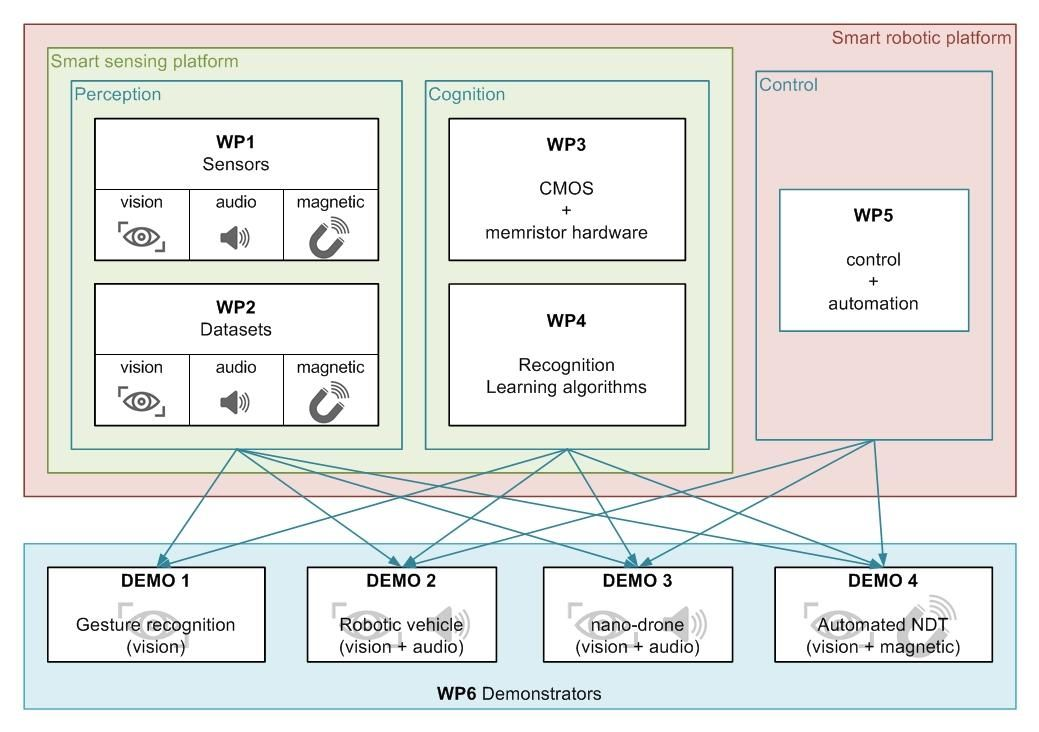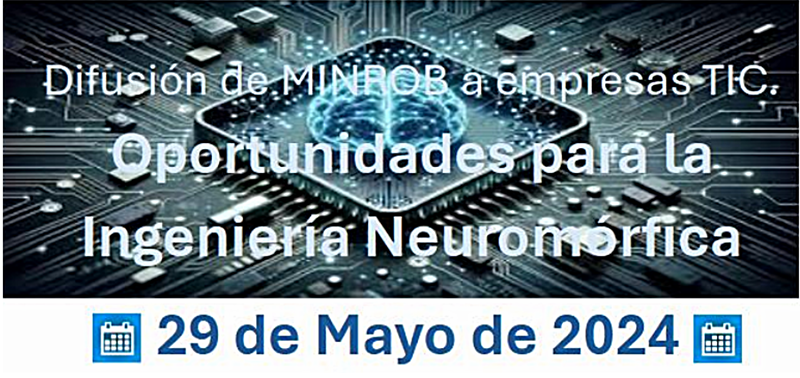Neuromorphic Perception and Cognition for High-Speed Robotic Actuation
Summary
The NANO-MIND project is a coordinated project divided in three subprojects: NANO-MEM, MIND-ROB and ED-SenNIA. NANO-MIND proposes an ambitious development of low power neuromorphic sensing-computing-actuation systems including on-line learning techniques exploiting the sparseness and compression advantages of spike-based coding from the sensor to the actuation level. It also proposes to advance in the development of advanced event-based sensors, the development of low power hardware implementations of cognitive computing systems, the development of hybrid nano-memristive adaptive computing modules and the integration of the hardware modules in robotic demonstration platforms.
Consequently, the project requires developments at different levels of abstraction, from low level custom hardware modules, digital programmable modules, computational algorithms up to mechanical and robotic control. The expertise at the different levels of abstraction of the project is not available in a single participating research group. However, the combination of the three involved groups creates the required synergies to successfully tackle all the different aspects proposed in the project.
The UV group has experience designing CMOS full custom event based hardware sensors: vision and magnetic. The IMSE group has experience designing event-based processors both in full custom CMOS technologies and digital programmable hardware. It has also proposed at a theoretical level hybrid CMOS-memristive neuromorphic learning systems and it has contributed to the theoretical development of event-based computing systems. The Robotic and Technology of Computers group in Seville (RTC) has experience in neuromorphic robotics control, audio processing and embedded co-design systems.
Furthermore, the combination of the three groups contribute to strengthen the position and visibility of the spanish research in the Neuromorphic Engineering international community which is currently one important research focus of the EU-funding scheme as demonstrated by the recent call FETPROACT-02-2018: Community building in Neuromorphic Computing Technologies and the upcoming call FETPROACT-09-2020: Neuromorphic computing technologies.
The NANO-MIND project ambition is to develop an efficient technology for perception, cognition and actuating AI systems based on asynchronous real-time generation, communication, processing and learning of events, where the events are abstract representations of biological spikes. The project will advance on developing sensors providing an efficient event-based representation of the signal, developing event-based processing and learning architectures and the corresponding cmos-memristive low power computation-in-memory hardware implementations, and developing event-based motor control strategies. The developed AI event-based technology will be integrated in several demonstrating platforms where the benefits of the technology can be benchmarked with solutions offered by other state-of-art event-based as well as conventional technologies.
The general objective of the present project NANO-MIND is to develop an efficient technology for AI sensing, processing and actuating systems based on the asynchronous real-time generation, communication, processing and learning of events. The project will contribute by developing sensors providing an efficient event-based representation of the signal, developing event-based processing and learning architectures and the corresponding cmos-memristive low power computation-in-memory hardware implementations, and developing event-based motor control strategies. The developed AI event-based technology will be integrated in several demonstrators where the benefits of the technology can be benchmarked with solutions offered by other state-of-art event-based as well as conventional technologies.
PI: Alejandro Linares Barranco / Ángel Francisco Jiménez Fernández
Type: Plan Estatal 2017-2020 Generación Conocimiento – Proyectos I+D+i
Reference: PID2019-105556GB-C33
Funding by: Ministerio de Ciencia, Innovación y Universidades
Start date: 01-06-2020
End date: 31-05-2024
Researchers and publications
Resources
- Git repositories
- MINDROB workshops to ICT companies



